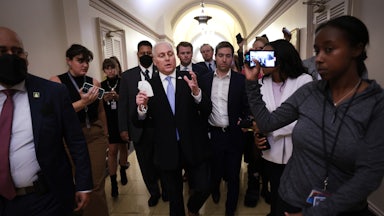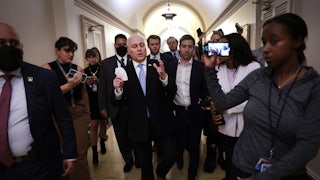A sense of resigned déjà vu permeated the House chamber on Tuesday, as representatives embarked on their latest vote to elect a new speaker of the House—which, if you’ve been keeping count, made it the sixteenth such vote this year. Actually, if you count the vote two weeks ago, when former Speaker Kevin McCarthy was ousted from his position in an unprecedented move instigated by a hard-right faction of the Republican conference, it was the seventeenth vote on the speakership.
But there is no end in sight. The GOP’s latest nominee for speaker, Representative Jim Jordan, did not win the majority of votes needed to be elected on Tuesday; 20 Republicans voted for another candidate. It was an unpleasant echo of the January rigamarole, in which McCarthy was made to suffer through 15 rounds of voting to become speaker. It was a process that took several days and required McCarthy to make multiple concessions to members on his right flank in order to earn their support.
In the first speaker vote on Tuesday, McCarthy earned six votes. Majority Leader Steve Scalise—who had been nominated by Republicans for the speakership last week, before withdrawing amid lack of support from some Jordan voters—earned seven. Jordan and his allies had pitched Jordan as the only Republican who could garner the necessary 217 votes on the floor: In her speech nominating Jordan for the speakership, Republican Conference Chair Elise Sfefanik quoted the Book of Esther in the Bible, calling him the candidate made “for times such as these.” (A thought experiment: taking a time machine back to 2016, and telling Republican representatives that the rabble-rousing co-founder of the House Freedom Caucus who had helped topple former Speaker John Boehner was the institutionalist, consensus Republican candidate for speaker.)
Jordan spent the weekend locking down votes from GOP members who had previously insisted they would never support him, an effort that was evidently unsuccessful. On Tuesday evening, Jordan announced that the next vote would occur on Wednesday—giving him more time to try to persuade those holdouts. After all, what’s one more day without a speaker, just a month before a government funding deadline?
While some representatives who had supported other candidates in Tuesday’s first vote appeared open to backing Jordan, others were steadfast in their opposition. “I am where I am,” said Representative Mario Diaz-Balart, who supported Scalise.
“It may look like the same game, but it’s not the same game,” insisted Representative Carlos Gimenez, who supported McCarthy in the vote, comparing Jordan’s iffy support to the 15 votes for the former speaker. Gimenez expressed frustration with the hardball tactics used by Jordan’s supporters to attempt to garner support. (Consider: the aggressive support for Jordan’s bid by conservative media, including some cheerleading by Sean Hannity.)
Even Republicans supporting Jordan acknowledge that the ongoing chaos has splintered the conference. Representative Byron Donalds, who initially resisted supporting McCarthy in January, said that he had thought Republicans were slowly growing to a point where they could find consensus. “From a professional standpoint, we were getting to a place where members can get the job done,” Donalds told reporters after the first vote. However, he continued, those relationships had been “damaged by the motion to vacate”—the official term for the process that eventually led to McCarthy losing his hard-won gavel. When asked how the temperament was among House Republicans now, Donalds replied: “Not good.”
It was clear by Tuesday that fatigue had set in among Republicans. “We all want to choose a speaker. And I’m tired of this,” Diaz-Balart said. Representative Bryan Steil said that it is “broadly frustrating” that the House was focused on electing a new speaker, rather than working to keep the government funded or send aid to Israel.
That fatigue was apparent during the first vote, when members largely seemed to be going through the motions. Ahead of the vote, Jordan—who is famous for avoiding jackets like the plague—was dressed with uncharacteristic spiffiness in a blue suit and gold tie. He spent the majority of the first vote looking ahead, a small smile fixed on his face as he fidgeted, or talking to an aide sitting next to him. McCarthy sat in the row directly behind Jordan, monitoring the vote to choose his successor.
The House is a chamber of pageantry as much as it is one of laws. After Jordan received a somewhat lackluster standing ovation from the Republican side, Democrats cheered repeatedly for Minority Leader Hakeem Jeffries as their nominee. But rather than focusing on Jeffries’s record, Democratic Caucus Chair Pete Aguilar spent his nominating speech slamming Jordan as an extremist without a significant legislative record and an “insurrection insider” who vocally supported the effort to overturn the 2020 presidential election.
“A vote today to make the architect of a nationwide abortion ban, a vocal election denier, and insurrection insider the speaker of this House would be a terrible message to the country and our allies,” Aguilar said.
Off the floor, Democrats responded to the situation with similar exasperation, in part because of their own antipathy for Jordan. While Jeffries had a relatively good relationship with McCarthy, Jordan lacks any real connection to Democrats.
“I feel like Halloween has come early,” Representative Jim McGovern told me, ahead of the first vote. “[Jordan] is like—rock bottom of who they could have picked to be their nominee.”
However, some Democrats indicated that they believed a Jordan speakership would not be much different from when McCarthy held the gavel. Representative Mark Pocan listed the ways in which Democrats felt betrayed by McCarthy, including the former speaker’s reneging on a government spending deal crafted with President Joe Biden. Pocan also noted that McCarthy, like Jordan, voted to overturn the 2020 election results in two states.
“We don’t expect anything different under Jim Jordan, other than you’ll get the vitriol from him that Kevin McCarthy kept inside. But as long as they let the extremist elements in their caucus actually run [the House], this is going to continue,” said Pocan. “There’s nothing Kevin McCarthy did governing that was different than what I think you would have seen Jim Jordan do this year.”
With Jordan’s path to the speakership uncertain, Republicans could begin casting about for yet another would-be successor. They may also consider further empowering Acting Speaker Pro Tempore Patrick McHenry to govern the chamber from that position, or even formally electing him to the post. For the moment, McHenry is a stopgap—he can preside over the vote for the next speaker, but the House rules dictating his responsibilities beyond that are muddy.
For example, government funding is set to run out in mid-November, and McHenry may not be vested with the authority to actually preside over appropriations bills. If the House continues to function—or rather, not function—sans speaker, the chaos could risk a government shutdown.
Donalds said that, outside of the Capitol, Americans care less about who is the speaker than what Congress can accomplish. “People are like, are you going to do this? That’s the only question. They’re not asking about how many votes and what’s the mood [in the conference], they’re not asking that kind of stuff. They’re asking, ‘Are you just going to get it done?’” Donalds said. “That’s what the American people want.”
For his part, Jordan insisted on Tuesday evening that he would continue his quest for the speakership. “No one in our conference wants to see a coalition government with the Democrats,” Jordan said. “We are going to keep working. We will get to the votes.”










